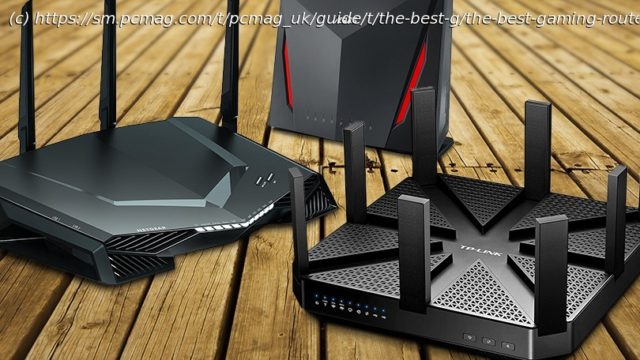Have a household of digital devices—and an online gamer or three? You need a router that’s ready-made to give gaming traffic the right of way. Here’s how to buy the right gaming router, along with our top-rated favorites.
If you’re a PC gaming enthusiast, you know about speed. Gaming rigs are good only if they’re tricked out with the latest and fastest CPUs, lots of memory, the quickest solid state drive (SSD), and, of course, the best graphic cards. But while that combination will definitely give you a fast machine, online gaming performance can still be hampered if it’s connected to a crowded network with an Internet connection controlled by an overburdened or old fashioned wireless router. Additionally, the majority of home networks are more taxed than ever because so many folks are working from home due to COVID-19. So if game performance is important to you, it’s well worth your time to take a close look at optimizing your network. Start with what’s connected. A whole family’s worth of gear can mean oodles of phones, tablets, TVs, streaming video/music devices, and smart home gear all connecting to—and hammering—the beleaguered household router. (It’s not an exaggeration that some households will have dozens of devices.) Any online gamers in the house must compete for that router’s bandwidth not only with everyone else but all those smart devices, too. And that can lead to unpredictable, often subpar, performance. Now, on a basic level, many routers, even those we classify as budget routers, offer Quality of Service (QoS) settings that let you give priority to devices or applications that require lots of bandwidth. But not many of them offer the gamer-centric settings and optimizations that you get with a dedicated gaming router. If network lag is messing with your game, read on to find out how a gaming router can give you back your competitive edge—and how to choose the one that best suits your household, your play style, and your budget. QoS: You Gotta Have Priorities Perhaps the biggest difference between a gaming router and a typical consumer router is how it handles QoS, or bandwidth prioritization duties. Almost all routers offer some sort of QoS. This can range from the generic Wi-Fi Multimedia (WMM) extensions that automatically prioritize network packets carrying data necessary for voice over IP (VoIP) and video conferencing apps on up to drag-and-drop prioritization that lets you assign a higher priority to specific devices connected to the network essentially making sure they experience better performance than other devices. Gaming routers go a step further, by offering prioritization for specific gaming systems and applications, and allowing you to decide how much bandwidth each client is entitled to. That can be especially important if you have multiple online gamers in the same household, who are all competing for the feed from the same pipe. For example, Linksys gaming routers have firmware that automatically gives network priority to devices that are equipped with Rivet Networks’ Killer Prioritization Engine (KPE). When the router detects a device equipped with Killer networking hardware, it gives that device the lion’s share of bandwidth to ensure smooth, lag-free online gameplay. Many gaming routers also use a modified management console with a gamer-friendly user interface that makes it easy to assign bandwidth priorities on the fly. Netgear recently began outfitting its gaming routers with DUMAOS, an interactive, gamer-friendly operating system developed by Netduma. It has a sleek-looking dashboard that lets you see what is going on with your network at a glance, with graphs showing real-time CPU and bandwidth usage, currently installed apps, guest networking status, Wi-Fi status, and internet status. It also has a Geo-Filter feature that can help reduce lag by limiting the distance to the host servers you play on. By setting your home location on the map and specifying a distance range, you can prevent players and servers that are outside of your range from hosting your game. You can also use customized software to enhance online gaming performance.






